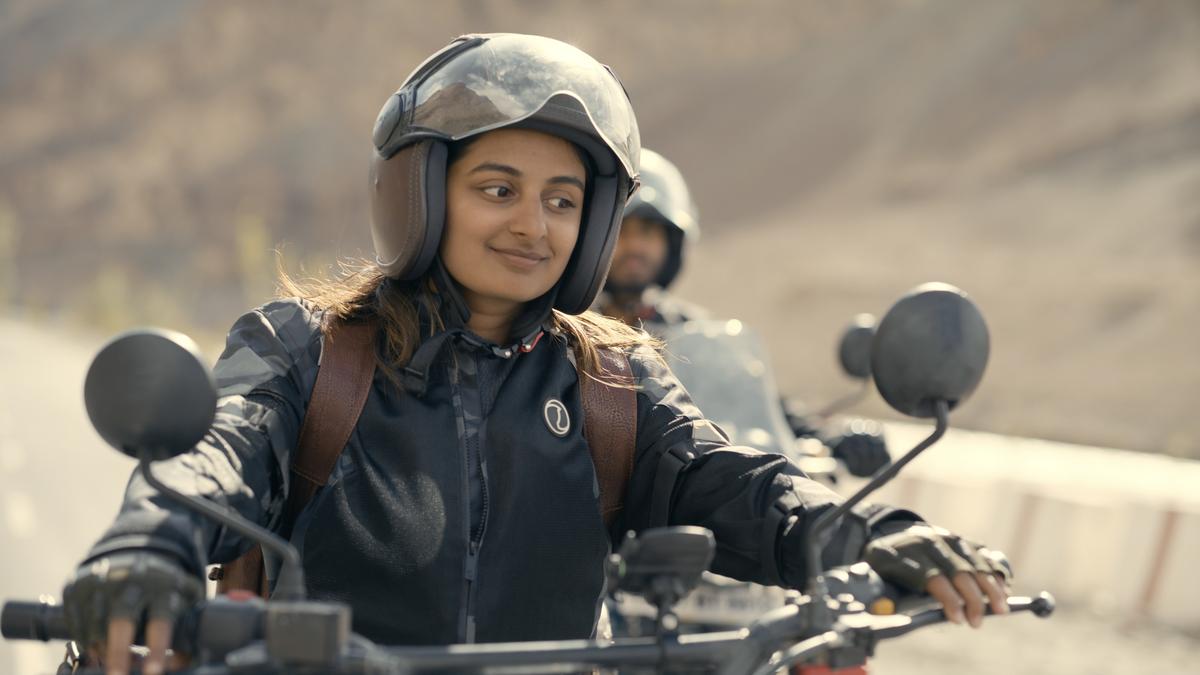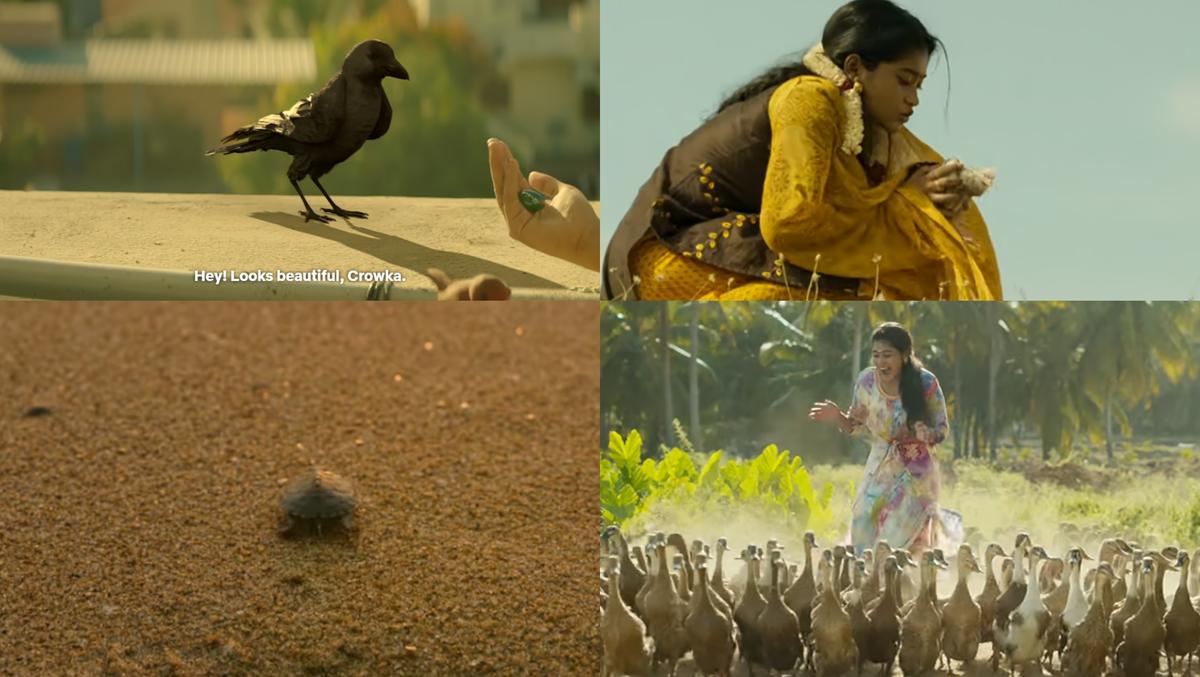Imagine holding onto a dream for nearly a decade, wielding unshakable trust in yourself, and giving your everything to see the other end of the tunnel. To realise her sophomore directorial Minmini, filmmaker Halitha Shameem has been on one such journey. The passion project that began a little after the release of her debut film, Poovarasam Peepee, was intentionally put on hold for the child actors of the film — Esther Anil, Praveen Kishore and Gaurav Kaalai — to grow older and reprise the adult versions of their characters. In 2022, Halitha shot the second half of the film, and now Minmini is finally all set to fly.
In all these years, even when she made other films like Sillu Karupatti, Aelay, or Loners (a segment in Putham Pudhu Kaalai Vidiyaadhaa), Halitha hasn’t missed a chance to speak about Minmini. However, with the art form and audiences evolving continuously, it is natural for a moment of self-doubt to creep in, isn’t it?
Halitha Shameem and Khatija Rahman
| Photo Credit:
Thamodharan B
That wasn’t the case with Minmini, says Halitha “I could never detach myself from this story. Every time I finished another film and came back to watch the footage, it kept exciting me and that’s because of the emotion behind it; sure, the way we make films might evolve but the emotions never change and the story always gave me that high,” she says, adding that she was conscious not to tamper the soul of her work even when she shot the second half after almost six years. “Maybe I would have added a couple of ideas, like the COVID-19 pandemic-induced lifestyle changes, but I never got insecure.”

A still from ‘Minmini’
| Photo Credit:
Special Arrangement
For Minmini to become what it is, music has played a pivotal role, as is evident from the trailer and the songs. Entrusting the responsibility to debutant composer Khatija Rahman (singer and the daughter of renowned composer AR Rahman) has borne fruit for Halitha.
Excerpts from a conversation:
Khatija, the songs of ‘Minimini’ are soul-stirring, especially ‘Iru Perum Nadhigal’. How did Halitha’s story speak to you when she narrated it?
The emotions. The story is a rollercoaster ride of emotions and that was my catch; I just wanted my music to be true to those emotions.
As the story goes beyond the boundaries of Tamil Nadu to the Himalayas, was there a discussion on native genres from that geography?
I initially thought of doing that, and we even spoke to some musicians about it. However, as the film’s composition went on, we didn’t feel the need to do that.
Halitha, it seems like your films are attempts at understanding grief, be it ‘Aelay,’ ‘Sillu Karupatti,’ ‘Loners,’ or even ‘Minmini’ which deals with survivor’s guilt…
I am glad you said that because people usually don’t read behind the ‘feel good’ factor of my films. I understand why they look at it that way, but I have explored grief as well. Minmini mainly talks about grief and suffering.
Khatija Rahman and Halitha Shameem
| Photo Credit:
Thamodharan B
It’s also fascinating how your characters know how to express themselves and they do it in such a precise and poetic manner. In ‘Loners,’ a character speaks about the ache of being unable to cry; in ‘Aelay,’ the opening dialogue tells you so much about the character and his relationship with his father. We can see this even in the trailer of ‘Minmini’. Are you expressing, through your characters, what you struggle to express by yourself?
Of course. Whenever I say something, I usually tend to come back to it and wonder if I could have expressed it better, or if I missed out something in that thought. But that’s not possible in real life, and because I have the luxury of going back to the script and editing the dialogue, I’m able to express myself more clearly through my characters. Of course, sometimes I am conscious not to spoon-feed the thought and try to be subtle. At the same time, I am not confident enough to leave something as it is — without dialogues — believing it would visually convey what I want.

Also, where does your love for birds come from? Quite often, films obsess solely about humans even though birds and animals are all around us. Your characters in ‘Sillu Karupatti’ and ‘Aelay’ express so much love for birds…
I like using birds as a metaphor, like in the lyrics and visuals of the ‘Seevanuke’ song in Aelay. In Sillu Karupatti, the connection between a crow and a human who nursed its injuries is based on a real story, and that fascinated me. Interestingly, however, I wasn’t much of a bird or animal lover in those times; I was more into stories involving humans with birds and animals. But over the last two years, I have become an animal lover. I am now taking care of more than 40 cats in my neighbourhood!

Stills from ‘Sillu Karupatti’ and ‘Aelay’
| Photo Credit:
Netflix
Khatija, once you knew the soundscape that Halitha wanted for this film, did you watch any other titles to understand what was required of you?
Yes. She showed me The Curious Case of Benjamin Button and The Secret Life of Walter Mitty.
She also made me explore the work of Rachel Portman, the first female composer to win an Oscar. I watched Hans Zimmers’ masterclass, which helped me before I started working on the film. However, we have also tried to break the mould; for instance, we used a specific instrument native to Turkey in a couple of songs, which was quite interesting.

Be it in music composition or people management, at which point do you turn to your father, AR Rahman, for guidance?
I do that when a specific situation arises, but nothing of that sort came up during Minmini. He just assured me that he was there if I needed anything at all. Moreover, because the director had a degree of awareness about the music, I just followed her vision. Of course, my father offered some advice in general — not necessarily film-centric — which I tried to implement in this film. When you have such a treasure of knowledge in your home, you obviously take in whatever you can from them.
Khatija Rahman
| Photo Credit:
Thamodharan B
Halitha, now that your characters in ‘Minmini’ are young adults, would you like to next make a film on their adulthood?
Firstly, I would like to clarify that this film doesn’t document how children grow up to become young adults, which many might wrongly perceive it to be because the same actors play the children and their adult versions.
Secondly, Minmini doesn’t touch upon just their age-related issues. When I did Poovarasam Peepee, I did think of doing another film once these characters were grown up, but that’s because the story lent itself to such an attempt. In Minmini’s case, a story begins and ends somewhere.
Halitha, after completing a decade as a filmmaker, what has changed about how you make films?
I used to be a bit insecure those days, replaying the scenes and anxiously wondering if they would hold the attention of the audience. I used to obsess over the elements that would make the scenes more pulsating. Now, for better or worse, I am just trusting myself and doing what I believe in.
Minmini is releasing in theatres on August 9
